HURINET (Uganda)
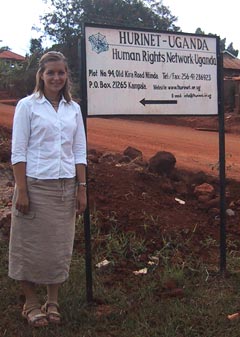 I spent ten weeks from June to mid August 2004 working for HURINET (U), a small human rights organization in Uganda. I originally applied for an internship with HURINET because of its similarity to a Canadian NGO I had worked for in Ottawa, the National Children's Alliance. I was excited to share my skills and knowledge from the NCA with the staff at HURINET. What I didn't anticipate is that I would be the one who would spend the summer learning from HURINET. During my time at HURINET and in Uganda I learned invaluable lessons about the practicalities of human rights work in a developing country, the interaction between international and domestic human rights law, and the role of a foreign lawyer - or law intern in effecting change. This experience was heart breaking, mind bending and definitely life changing.
I spent ten weeks from June to mid August 2004 working for HURINET (U), a small human rights organization in Uganda. I originally applied for an internship with HURINET because of its similarity to a Canadian NGO I had worked for in Ottawa, the National Children's Alliance. I was excited to share my skills and knowledge from the NCA with the staff at HURINET. What I didn't anticipate is that I would be the one who would spend the summer learning from HURINET. During my time at HURINET and in Uganda I learned invaluable lessons about the practicalities of human rights work in a developing country, the interaction between international and domestic human rights law, and the role of a foreign lawyer - or law intern in effecting change. This experience was heart breaking, mind bending and definitely life changing.
HURINET (U) is a network organization that brings together twenty seven human rights groups in Uganda for stronger linkages and cooperation in the effective use of resources for the defence and promotion of peace, democracy and human rights. I worked under HURINET's Advocacy and Networking Program as an assistant to Brian Mulyanti, the Program Officer. In this capacity I researched and prepared funding proposals and budgets for legislative advocacy projects, I coordinated and attended networking meetings with new members, and I prepared a publication index of HURINET's member organizations literary works. Each task that I was accustomed to doing in Canada was steeped in difficulties related to working in a developing country for an under resourced NGO. Office resources were limited and tasks as simple as making a local phone call required strict reporting that has to be facilitated by the administrative assistant.
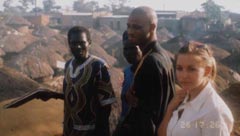 My experience within the advocacy program, both in strategizing for future projects, and in implementing current ones acquainted me with HURINET's multi faceted approach to advocacy. For each project HURINET would plan and implement a diverse program of sensitization workshops, regional consultations, media campaigns and one-on-one meetings. I observed the practical value of having personal connections with decision makers, and was impressed by the engagement of the local media on these issues. I also had a lesson in politics on my second day with HURINET when I was abruptly introduced to the importance of foreign diplomatic relations in effecting change. A member of the European Commission informed HURINET quite frankly that they were backing our most recent advocacy campaign with the aim of protecting the international image of the European Commission.
My experience within the advocacy program, both in strategizing for future projects, and in implementing current ones acquainted me with HURINET's multi faceted approach to advocacy. For each project HURINET would plan and implement a diverse program of sensitization workshops, regional consultations, media campaigns and one-on-one meetings. I observed the practical value of having personal connections with decision makers, and was impressed by the engagement of the local media on these issues. I also had a lesson in politics on my second day with HURINET when I was abruptly introduced to the importance of foreign diplomatic relations in effecting change. A member of the European Commission informed HURINET quite frankly that they were backing our most recent advocacy campaign with the aim of protecting the international image of the European Commission.
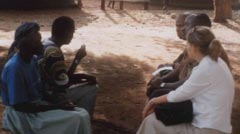 This political aspect also became apparent in the preparation of funding proposals, as both foreign and domestic donors would maintain stringent requirements for funding projects. Donors would dictate project activities, timelines, phases and sometimes even its goals. Funding corresponded with the priorities of the donors, and thus HURINET was forced to plan its project activities around someone else's goals. The demands of funders also required the dedication of enormous staff resources to writing and rewriting funding proposals and budgets to suit the needs of their funders.
This political aspect also became apparent in the preparation of funding proposals, as both foreign and domestic donors would maintain stringent requirements for funding projects. Donors would dictate project activities, timelines, phases and sometimes even its goals. Funding corresponded with the priorities of the donors, and thus HURINET was forced to plan its project activities around someone else's goals. The demands of funders also required the dedication of enormous staff resources to writing and rewriting funding proposals and budgets to suit the needs of their funders.
Domestic politics also played an important role in my experience at HURINET. In the international arena, Uganda is presented as a model democracy. There is a democratically elected President, the rate of HIV/AIDS infections is decreasing and the economy is growing. However upon staying in Uganda for more than 24 hours, or accessing a single piece of public media one realizes that this image is a façade. During my ten weeks in Uganda, the Constitutional Court ruled that the Government was illegally elected, and thus totally illegitimate. The President responded with a 45-minute public address on the radio denouncing the judiciary, claiming that it has no power and encouraging civilians to take to the streets in protest. Meanwhile, a Constitutional review process is ongoing, largely to determine if the Constitution will be amended to allow Museveni to run for a third term, which is currently unconstitutional. The non governmental organizations and the media regularly report human rights abuses by the state, and there has been civil conflict and unrest for the last seventeen years. This all leads to a human rights community that is well educated, and well equipped to carry out advocacy work, but are limited in their capacity to challenge state actions. It means that vast resources are dedicated to anti-corruption campaigns. It means that HURINET allows for "contingencies" when planning its project budgets, to account for hospital bills should staff members be beaten in the course of project activities. For my Ugandan counterpart, a human rights law student named Connie, it means that she would support the third term amendment for Museveni if "peace" will be maintained within the country.
For me, working in this environment meant being continually surprised by lurking instability and civil unrest, the illegitimacy of state action that no one can seem to advocate against, and dealing with the reality that the current state of affairs is much better than what most Ugandans remember. This stark reality gave a new meaning to the adage "Learn to pick your battles," as Ugandan Human rights groups are constantly being asked to balance their work against their personal safety. This reality is one that is overwhelming, heart breaking and incredibly frustrating. For me, it meant looking at human rights advocacy in an entirely new way.
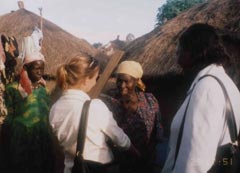 In addition to these mind-spinning realizations, I had the opportunity to experience first hand the disparity between international human rights law in theory, as taught in the classroom; and international human rights law in practice. In December 2003 President Museveni referred the case of the Lord's Rebellion Army to the Prosecutor of the International Criminal Court for investigation. As one of the court's first two cases, everyone had been uncertain as to how this process would unfold in Uganda, and what the practical implications would be. During a week in late June I hosted and coordinated a visit from Benson Olugbuo, the regional director for Anglo Africa of the Coalition for the International Criminal Court. Benson was visiting Uganda with an aim of sensitizing Uganda NGOs to the work of the court and cultivating their cooperation and participation with the investigation, while also ascertaining a well balanced view of the conflict in Northern Uganda. During his visit we attended meetings with a number of NGOs, Members of Parliament, researchers, and other stakeholders. We also visited Gulu, in Northern Uganda where we visited an internally displaced persons camp and a night commuter centre and interviewed affected parties.
In addition to these mind-spinning realizations, I had the opportunity to experience first hand the disparity between international human rights law in theory, as taught in the classroom; and international human rights law in practice. In December 2003 President Museveni referred the case of the Lord's Rebellion Army to the Prosecutor of the International Criminal Court for investigation. As one of the court's first two cases, everyone had been uncertain as to how this process would unfold in Uganda, and what the practical implications would be. During a week in late June I hosted and coordinated a visit from Benson Olugbuo, the regional director for Anglo Africa of the Coalition for the International Criminal Court. Benson was visiting Uganda with an aim of sensitizing Uganda NGOs to the work of the court and cultivating their cooperation and participation with the investigation, while also ascertaining a well balanced view of the conflict in Northern Uganda. During his visit we attended meetings with a number of NGOs, Members of Parliament, researchers, and other stakeholders. We also visited Gulu, in Northern Uganda where we visited an internally displaced persons camp and a night commuter centre and interviewed affected parties.
Throughout these meetings a number of issues were raised all concerning the ongoing investigation and its implications for Uganda, and the victims of the conflict. These included: the need for a fair investigation and the questionable ability of the court to investigate crimes committed by government authorities while being housed in the Ugandan Department of Justice and operating at the cooperation of the state; the lack of enforcement mechanisms of the ICC, including the lack of a police force or military to make arrests and the ability or lack thereof of the court to protect witnesses; the substantial movement and efforts towards peace and reconciliation processes by local leaders and members of the communities, including an Amnesty Law, and the undermining of these efforts by the courts investigation; the inability of the investigation to end the conflict or address its root causes; and the use of the ICC as a political tool, either in the promotion of President Museveni's image worldwide, or otherwise to implicate the government of Sudan as a supporter of the LRA.
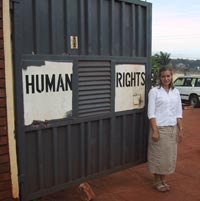 The most striking issue raised for me was the tension between the local peace and reconciliation efforts and the international justice goal espoused by the court. While this is a topic often covered in international law classes, it is much more striking when a woman who has lived in an IDP camp for 14 years, and bore 4 of her 5 children there tells you that she would forgive the rebels for their crimes, as her priority is to go home. This experience challenged my conceptions of international justice and helped me to understand firsthand the difficult role for international law in protecting human rights domestically.
The most striking issue raised for me was the tension between the local peace and reconciliation efforts and the international justice goal espoused by the court. While this is a topic often covered in international law classes, it is much more striking when a woman who has lived in an IDP camp for 14 years, and bore 4 of her 5 children there tells you that she would forgive the rebels for their crimes, as her priority is to go home. This experience challenged my conceptions of international justice and helped me to understand firsthand the difficult role for international law in protecting human rights domestically.
My experience in Uganda, and particularly in Gulu touched my heart, and challenged the way that I think about human rights and the world. It helped me to strengthen my dedication to human rights law, and my determination to pursue a career in this field.

 I spent ten weeks from June to mid August 2004 working for HURINET (U), a small human rights organization in Uganda. I originally applied for an internship with HURINET because of its similarity to a Canadian NGO I had worked for in Ottawa, the National Children's Alliance. I was excited to share my skills and knowledge from the NCA with the staff at HURINET. What I didn't anticipate is that I would be the one who would spend the summer learning from HURINET. During my time at HURINET and in Uganda I learned invaluable lessons about the practicalities of human rights work in a developing country, the interaction between international and domestic human rights law, and the role of a foreign lawyer - or law intern in effecting change. This experience was heart breaking, mind bending and definitely life changing.
I spent ten weeks from June to mid August 2004 working for HURINET (U), a small human rights organization in Uganda. I originally applied for an internship with HURINET because of its similarity to a Canadian NGO I had worked for in Ottawa, the National Children's Alliance. I was excited to share my skills and knowledge from the NCA with the staff at HURINET. What I didn't anticipate is that I would be the one who would spend the summer learning from HURINET. During my time at HURINET and in Uganda I learned invaluable lessons about the practicalities of human rights work in a developing country, the interaction between international and domestic human rights law, and the role of a foreign lawyer - or law intern in effecting change. This experience was heart breaking, mind bending and definitely life changing. My experience within the advocacy program, both in strategizing for future projects, and in implementing current ones acquainted me with HURINET's multi faceted approach to advocacy. For each project HURINET would plan and implement a diverse program of sensitization workshops, regional consultations, media campaigns and one-on-one meetings. I observed the practical value of having personal connections with decision makers, and was impressed by the engagement of the local media on these issues. I also had a lesson in politics on my second day with HURINET when I was abruptly introduced to the importance of foreign diplomatic relations in effecting change. A member of the European Commission informed HURINET quite frankly that they were backing our most recent advocacy campaign with the aim of protecting the international image of the European Commission.
My experience within the advocacy program, both in strategizing for future projects, and in implementing current ones acquainted me with HURINET's multi faceted approach to advocacy. For each project HURINET would plan and implement a diverse program of sensitization workshops, regional consultations, media campaigns and one-on-one meetings. I observed the practical value of having personal connections with decision makers, and was impressed by the engagement of the local media on these issues. I also had a lesson in politics on my second day with HURINET when I was abruptly introduced to the importance of foreign diplomatic relations in effecting change. A member of the European Commission informed HURINET quite frankly that they were backing our most recent advocacy campaign with the aim of protecting the international image of the European Commission.  This political aspect also became apparent in the preparation of funding proposals, as both foreign and domestic donors would maintain stringent requirements for funding projects. Donors would dictate project activities, timelines, phases and sometimes even its goals. Funding corresponded with the priorities of the donors, and thus HURINET was forced to plan its project activities around someone else's goals. The demands of funders also required the dedication of enormous staff resources to writing and rewriting funding proposals and budgets to suit the needs of their funders.
This political aspect also became apparent in the preparation of funding proposals, as both foreign and domestic donors would maintain stringent requirements for funding projects. Donors would dictate project activities, timelines, phases and sometimes even its goals. Funding corresponded with the priorities of the donors, and thus HURINET was forced to plan its project activities around someone else's goals. The demands of funders also required the dedication of enormous staff resources to writing and rewriting funding proposals and budgets to suit the needs of their funders. In addition to these mind-spinning realizations, I had the opportunity to experience first hand the disparity between international human rights law in theory, as taught in the classroom; and international human rights law in practice. In December 2003 President Museveni referred the case of the Lord's Rebellion Army to the Prosecutor of the International Criminal Court for investigation. As one of the court's first two cases, everyone had been uncertain as to how this process would unfold in Uganda, and what the practical implications would be. During a week in late June I hosted and coordinated a visit from Benson Olugbuo, the regional director for Anglo Africa of the Coalition for the International Criminal Court. Benson was visiting Uganda with an aim of sensitizing Uganda NGOs to the work of the court and cultivating their cooperation and participation with the investigation, while also ascertaining a well balanced view of the conflict in Northern Uganda. During his visit we attended meetings with a number of NGOs, Members of Parliament, researchers, and other stakeholders. We also visited Gulu, in Northern Uganda where we visited an internally displaced persons camp and a night commuter centre and interviewed affected parties.
In addition to these mind-spinning realizations, I had the opportunity to experience first hand the disparity between international human rights law in theory, as taught in the classroom; and international human rights law in practice. In December 2003 President Museveni referred the case of the Lord's Rebellion Army to the Prosecutor of the International Criminal Court for investigation. As one of the court's first two cases, everyone had been uncertain as to how this process would unfold in Uganda, and what the practical implications would be. During a week in late June I hosted and coordinated a visit from Benson Olugbuo, the regional director for Anglo Africa of the Coalition for the International Criminal Court. Benson was visiting Uganda with an aim of sensitizing Uganda NGOs to the work of the court and cultivating their cooperation and participation with the investigation, while also ascertaining a well balanced view of the conflict in Northern Uganda. During his visit we attended meetings with a number of NGOs, Members of Parliament, researchers, and other stakeholders. We also visited Gulu, in Northern Uganda where we visited an internally displaced persons camp and a night commuter centre and interviewed affected parties. The most striking issue raised for me was the tension between the local peace and reconciliation efforts and the international justice goal espoused by the court. While this is a topic often covered in international law classes, it is much more striking when a woman who has lived in an IDP camp for 14 years, and bore 4 of her 5 children there tells you that she would forgive the rebels for their crimes, as her priority is to go home. This experience challenged my conceptions of international justice and helped me to understand firsthand the difficult role for international law in protecting human rights domestically.
The most striking issue raised for me was the tension between the local peace and reconciliation efforts and the international justice goal espoused by the court. While this is a topic often covered in international law classes, it is much more striking when a woman who has lived in an IDP camp for 14 years, and bore 4 of her 5 children there tells you that she would forgive the rebels for their crimes, as her priority is to go home. This experience challenged my conceptions of international justice and helped me to understand firsthand the difficult role for international law in protecting human rights domestically.